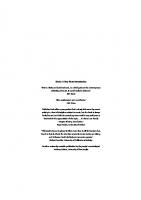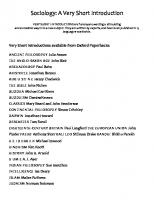Social and Cultural Anthropology: A Very Short Introduction (Very Short Introductions) 0192853465, 9780192853462
"If you want to know what anthropology is, look at what anthropologists do," write the authors of Social and C
298 68 17MB
English Pages 168 [173] Year 2000
Recommend Papers
File loading please wait...
Citation preview
John Monaghan and Peter Just
SOCIAL AN D CULTURAL ANTH ROPOLOGY A Very Short Introduction
OXFO RD VNl\'U.s rn "R HSS
OXFORD VN'VHJITY n U l
Cily P_ 10 tM IJI( iMd 10 b,fy セNG・、@ by I..... or .... d .. te"", "!I,.td ";!h the >wg in "....bliution Dot • ....... oghon. JoI>n. Sodol ."d , ,,"-..,01 MlIhrot>dovY: • v"-"Y >hoot BLo\iオエセ@ JJssion. He was as5el.sed a
minor tinr and was made 10
belore I...... MonP: begging Iorgiw-ness. セ@
SM gaw him a symbok slolp on the head, in;! he wiS let go. l。エセ@
thoat alterroon. I dOllied with a friend. I said. 'Wasn't thoat terrble.
what 101 Nindoe did. assaulting I...... Mone like that r He answered. "Yes. It
was. BlA)'OI.I know he ne.oer
ヲ・。ャセ@
hit her: I was surpri5ed . WIlat about
the tom shirl ind her fiKeT, I aslgraphic subtectivity be overcome? The origins of participant observation as the hallmark method of anthropology began at the end of the last century CIS an attempt to compensate for the varia ble reliability of descriptiOns of r1On.Western peoples. Not content to rely on エイセ ・ ャ・イウ G@ t ales, misoonary accounts, and official colonial reports d 'customs and m,mners·. W. H. lt Rivers, Bronislaw MaUnowskl. Franz Boas, and others among the founders of modem professional anthropology Insisted on the firs t-hand collection of ethnographic data by trained obsenK!fs. lt was their hope tha t training would suffi ce to compensate lor the prejudices 01 the observer. In the 1951 edition of the RoyalAnthropologicallnstitute's Not.es and Queries on Anthropology the uninitiated were told that 'amateurs untra ined in anthrop:Jlogy ... are apt to assume that they are free from bias. This.
"
however, is far from the case; without a scientifIC training their observiltlon will certailly be ha mpered I.1y' preconceived attitudes of mind,' Standard ized categories for data collection, such as those preserted il Notes and Queries and tile Human RelationsArea Files' Outlineo{ Cultural Material5, had been created in an attempt to overcome observer bliIS and ensure the comparability of data collected
by diflefent e thnographers, In the 19JOS some American anthropologists even went so far as to undergo psychoarlillysis before fi ektNo lk il an att empt to 'calibrate' the instrument of data collection, a practiCe quiCkly abandoned, Other notable a ttempts to OV(!f'(ome these epislI'mOlogical problems have IndJded re-s tudies and studies undertaken by teams of
.f
ethnographers, 001" would think thilt iI scientific approach to gathering
1.:
ethnogrilphlc data would encourilge anthropologists to re-study _ com munities that had been studied bebre by otherethoographers as a
'
i1 u
j
chec k against sl.bjectivlty or bias, But thiS is la rfrom common, To some extent thi s ha s been du e to a sense of urgency among anthropologi sts to conduct 'salvoge ethnogrophy', Many have been concerned that most
01 the world's smaller societies ilnd trilditional ways 01 IiiI' are fast disappearing and that it is more important to record those that have never been studied than to confirm results ak-eady collected, It must also be admitted that many anthropologists were f..st attracted to the field 11)' the romantic image of the lone, intrepid explorer, and that an unspoken ethnographiC 'machismo' has attached itself to those who
have stud ied tile ーイ・yゥッオセ@
unstudied , There has been, altogether, an understandable II misguided sense of proprietorship on the par t d an ethnographer br 'tis' o r 'her people' whiCh has made it very diffKutt IOfone e thnographer to 'poadl' on the 'territory' of another, Finally, it hilS been rare fOf e thnographers working in communities that have been studied before to approach those communities i..erested in precisely the same theoretical or ethnographic iss ues as their predecesSOfS, And because rocieties can change rapidly, separation in time 01even a few years between iln initial study and the next stu::iy
"
also makes It difficult for re-studies to provide a check on ethnographic objectivity, On occasion, anthropologists
ィ。セ@
engaged in the studyof a particular
community t7)' a team of researthers, partly to provide greall'r comprehensiveness and partly to compensate fOf individual OOsE'IVer bias. The 'Modjol









![Writing and Script: A Very Short Introduction (Very Short Introductions) [Illustrated]
9780199567782](https://ebin.pub/img/200x200/writing-and-script-a-very-short-introduction-very-short-introductions-illustrated-9780199567782.jpg)
